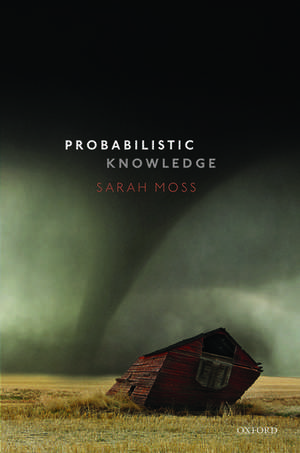Probabilistic Knowledge
Autor Sarah Mossen Limba Engleză Hardback – 22 feb 2018
| Toate formatele și edițiile | Preț | Express |
|---|---|---|
| Paperback (1) | 186.83 lei 10-16 zile | |
| OUP OXFORD – 27 feb 2020 | 186.83 lei 10-16 zile | |
| Hardback (1) | 506.06 lei 31-37 zile | |
| OUP OXFORD – 22 feb 2018 | 506.06 lei 31-37 zile |
Preț: 506.06 lei
Preț vechi: 579.46 lei
-13% Nou
Puncte Express: 759
Preț estimativ în valută:
96.84€ • 100.53$ • 80.75£
96.84€ • 100.53$ • 80.75£
Carte tipărită la comandă
Livrare economică 13-19 martie
Preluare comenzi: 021 569.72.76
Specificații
ISBN-13: 9780198792154
ISBN-10: 0198792158
Pagini: 282
Dimensiuni: 163 x 242 x 24 mm
Greutate: 0.59 kg
Editura: OUP OXFORD
Colecția OUP Oxford
Locul publicării:Oxford, United Kingdom
ISBN-10: 0198792158
Pagini: 282
Dimensiuni: 163 x 242 x 24 mm
Greutate: 0.59 kg
Editura: OUP OXFORD
Colecția OUP Oxford
Locul publicării:Oxford, United Kingdom
Notă biografică
Sarah Moss is Associate Professor of Philosophy at the University of Michigan, Ann Arbor. She received her A.B. in Mathematics from Harvard University and her B.Phil. in Philosophy from Oxford University, where she studied as a Marshall Scholar. She received her Ph.D. in Philosophy with a minor in Linguistics from MIT in 2009.
Recenzii
Essential reading for philosophers of language, semanticists, and formal epistemologists. . . . Probabilistic Knowledge offers a persuasive case for a radical revision of some foundational ideas about the nature of content and communication. . . . rich and rewarding.
The title concept of this book, probabilistic knowledge, involves a radical revision of some central ideas of epistemology. But it ends up providing a more unified account of many phenomena of recent interest. Philosophers with an interest in the formal semantics of conditionals or epistemic modals, and epistemologists working on contextualism or the interaction of credence and belief, should probably read most or all of this book. And many other philosophers should also find a copy.
The title concept of this book, probabilistic knowledge, involves a radical revision of some central ideas of epistemology. But it ends up providing a more unified account of many phenomena of recent interest. Philosophers with an interest in the formal semantics of conditionals or epistemic modals, and epistemologists working on contextualism or the interaction of credence and belief, should probably read most or all of this book. And many other philosophers should also find a copy.
